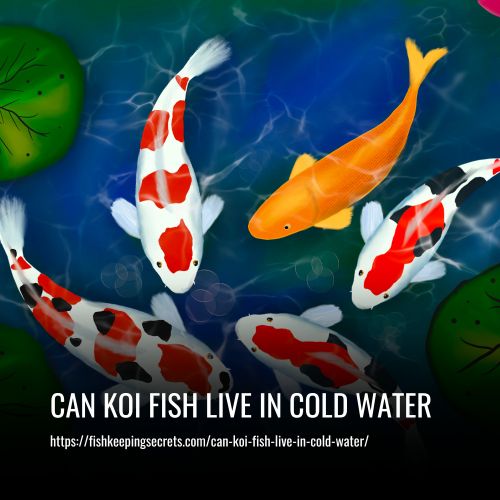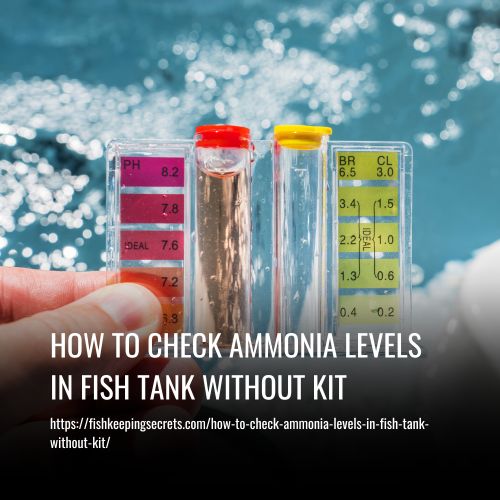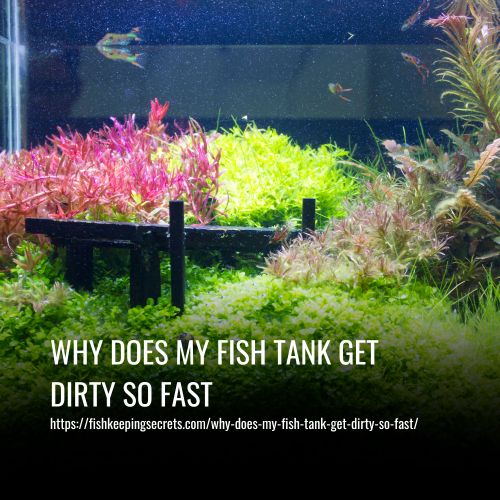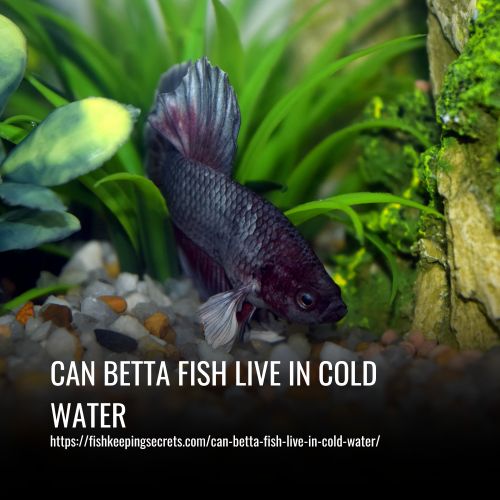Koi fish can survive in cold water, but they prefer water temperatures between 59-77 degrees Fahrenheit. In colder temperatures, their metabolism slows down and they become less active. It’s important to provide proper winter care for koi fish in colder climates to ensure their survival.

Is Cold Water Good For Koi?
Koi are typically a temperate-water fish species, which means they thrive in temperatures between 68 and 78 degrees. However, cold water can be just as detrimental to koi as warm water is beneficial. To determine if Koi can survive in cold water, we must first know the parameters needed for their survival.
Temperatures below 59 degrees Fahrenheit could potentially cause harm to the fish and should therefore be avoided. Knowing the temperature range and examining fish for signs of white spot disease is critical for any successful koi-keeping endeavor.
Can Koi Die From Cold Water
Koi are delicate fish that require certain conditions to survive. Extreme cold can be deadly for koi as their metabolism will slow down below 59-50 degrees Fahrenheit and if the pond freezes, they can suffocate.
To protect your koi from cold weather, you must provide them with a pond that has both shallow and deep areas to allow them to warm up, prevent freezing and install a heater to maintain the temperature above 50 degrees Fahrenheit. Taking the right steps can help your koi remain in good health and condition during the winter.
How To Keep Koi Fish Alive In Cold Water
Keeping koi alive and warm in cold water can be tricky, but it is definitely doable. There are a few steps you can take to make sure your fish stay healthy during the winter. Installing a pond heater, aeration system, or pond de-icer can all help keep your water from freezing over. An alternative to keeping koi outdoors is to move them to an indoor tank.
Additionally, adding plants can keep the water warmer by absorbing sunlight and providing shelter for your fish. With these tips, your koi should easily survive any cold temperatures this winter has in store.
What Temperature Should You Keep Your Koi Fish Tank?
Koi are an increasingly popular pet fish option, as they add color and activity to your yard or home. Keeping koi healthy requires a specific temperature range in the water where they live. As a koi owner, it is important to understand what that range is and make sure their tank or pond stays within the ideal parameters at all times.
Failure to keep your koi’s water in the acceptable temperature range can have serious consequences for your fish. Koi rely on the warmth of the water to aid in their digestion process and will not be able to digest food if the temperature gets too low – leading ultimately to the death of a beloved pet.
In this article, we will look at how you can ensure your koi’s water stays within its ideal temperature range so that your fish remain safe and healthy.
1. Temperature Range:
Koi fish have a resilient nature that allows them to survive in a wide range of temperatures. According to Koi Acres, a company specializing in the care for koi, koi can survive in temps ranging from 34 to 90 degrees. Despite this wide range, prolonged exposure to such extreme temperatures is not healthy for these fish. The best temperature for optimal koi health is around 65 degrees Fahrenheit or slightly higher.
When maintaining an aquarium for koi, temperature control must be taken into careful consideration. While certain temperatures may be more comfortable and healthier for koi than others, it is important to monitor changes in temperature and take steps to adjust the tank’s environment appropriately. Furthermore, maintenance techniques such as regular tank cleaning, adequate filtration systems, and proper water testing should also be utilized not just to maintain temperature but also the overall health of the koi within the tank.
2. Cold Water Koi Care:
Winter brings colder weather, and for Koi ponds this means special considerations to protect the fish. Koi are poikilothermic, meaning their metabolic activity is dependent on water temperature. If the temperature of your pond drops below 52 degrees Fahrenheit, you should no longer feed your koi in order to prevent further drops in temperature. Additionally, fluctuations in temperature can cause stress on your fish’s systems as they try to adapt.
To ensure your koi remain healthy during the winter months, they must be provided with a certain level of movement and oxygenation. The water reaches its densest point at 39.16°F, so Koi will spend most of their time at the bottom of ponds where it is warmer; however, they still need some bouts of swimming throughout the season to keep their joints limber.
Finally, it is not recommended to forget about your koi pond during winter and wait until spring to resume maintenance – neglecting them could result in fish floating upside-down due to lack of oxygenation or food intake. It’s important not only to provide adequate warmth but also a stable temperature for the optimal health of your koi fish year-round!
Can Koi Fish Survive Winter In Outdoor Pond
Maintaining a healthy koi pond in winter can be challenging, especially as temperatures drop. Fortunately, koi fish have the ability to survive in cold weather – as long as they have a safe and suitable habitat. With the right precautions and measures, your koi can make it through even the coldest winters.
Koi need open water to breathe and to stay active, meaning that any ice which forms needs to be broken up quickly and regularly. As food is hardly eaten during winter months, you should reduce how much you feed your koi accordingly. Installing tools such as pond heaters or bubble systems can help keep your koi active during winter months by reducing the formation of ice in their environment.
By following these simple steps, you can ensure that your koi are well-protected from any frigid cold weather conditions! This way, your fish will enjoy good health all year round without having their activity restricted by extreme weather conditions.
FAQs
Yes, koi fish can indeed live in cold water. They are hardy fish that can tolerate a wide range of temperatures, including cold water conditions.
Koi fish thrive in water temperatures ranging from 59°F to 77°F (15°C to 25°C). However, they can survive in temperatures as low as 50°F (10°C) and as high as 86°F (30°C), albeit with some adjustments.
While koi fish don’t hibernate in the traditional sense, they do become less active during colder months when water temperatures drop. They may spend more time at the bottom of the pond and eat less during this time.
To prepare your pond for winter and ensure your koi fish remain healthy, it’s crucial to provide adequate insulation and aeration. This can be achieved by installing a pond heater or de-icer to prevent the water from freezing completely and by using a pond aerator to maintain oxygen levels.
As water temperatures drop below 50°F (10°C), it’s recommended to stop feeding your koi fish altogether. Their metabolic rate decreases in colder water, and they have difficulty digesting food, which can lead to health issues if they continue eating.
Conclusion:
Koi fish can live in cold water as long as the temperature stays within a few degrees of their regular range. With regular care and attention, koi fish can be a great addition to your outdoor pond. Koi are surprisingly hardy fish and they can survive even in the harshest of conditions if given the right environment.
Keeping your koi’s water at an optimal temperature will ensure that your beloved companion is healthy and happy for many years to come.



